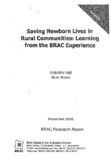| dc.contributor.author | Hadi, Abdullahel | |
| dc.contributor.author | Ahmed, Munir | |
| dc.date.accessioned | 2019-11-25T06:19:11Z | |
| dc.date.available | 2019-11-25T06:19:11Z | |
| dc.date.issued | 2005-12 | |
| dc.identifier.citation | Hadi, A., & Ahmed, M. (2005, December). Saving newborn lives in rural communities: learning from the BRAC experience. Research Reports (2005): Health Studies, Vol - XXXVIII, 269–283. | en_US |
| dc.identifier.uri | http://hdl.handle.net/10361/13107 | |
| dc.description.abstract | SNL study is a pilot project of BRAC to improve the health of the newborn in two sub-districts
in Bangladesh. Neonatal mortality -- major health crisis in the poor countries -- has gripped
poor countries for many years. This problem has been compounded by a lack of health care
resources and poverty. The neonatal mortality has been very high in Bangladesh. Policy
makers are therefore seeking ways to reduce illness and prevent deaths by improving neonatal
care in the home and at local health facilities.
Method
SNL project has two service delivery strategies tb improve the health of the neonates. The
operations research (OR) design includes a comparison area for each of the two delivery
strategies. All women living in the study areas, who gave birth were identified and included in
this study. The data were collection for this study continued from March 2004 - March 2005.
The data collection includes several steps: identification of pregnant women, antenatal
interview before two weeks of the delivery, interview at 48 hours after delivery and follow-up
interviews after four weeks of delivery.
Outcomes
The outcome measures include changes in patterns of home care, health practices and referral.
Other outcomes included estimates of neonatal mortality and illness. The study also generated
a body of information on the process of introducing such an intervention in communities, and
on the programme experiences with planning and participation.
Lessons Learned
The SNL initiative demonstrates that safe delivery and essential newborn care can be
strengthened at the community level. Short duration of programme implementation is unlikely
to produce visible changes and, thereby, to reach to any credible conclusions. Not all
improvements are likely to sustain in the absence of continuity of the efforts. The programme
design and implementation plan could have been more realistic than it has been. | en_US |
| dc.language.iso | en | en_US |
| dc.publisher | BRAC Research and Evaluation Division (RED) | en_US |
| dc.subject | BRAC | en_US |
| dc.subject | Rural Bangladesh | en_US |
| dc.subject | Rural community | en_US |
| dc.subject | Newborn lives | en_US |
| dc.subject.lcsh | Newborn infants--Health and hygiene | |
| dc.subject.lcsh | Newborn infants--Mortality | |
| dc.subject.lcsh | Newborn infants--Death | |
| dc.subject.lcsh | Health, Nutrition, and Population Program (BRAC) | |
| dc.title | Saving newborn lives in rural communities: learning from the BRAC experience | en_US |
| dc.type | Research report | en_US |

